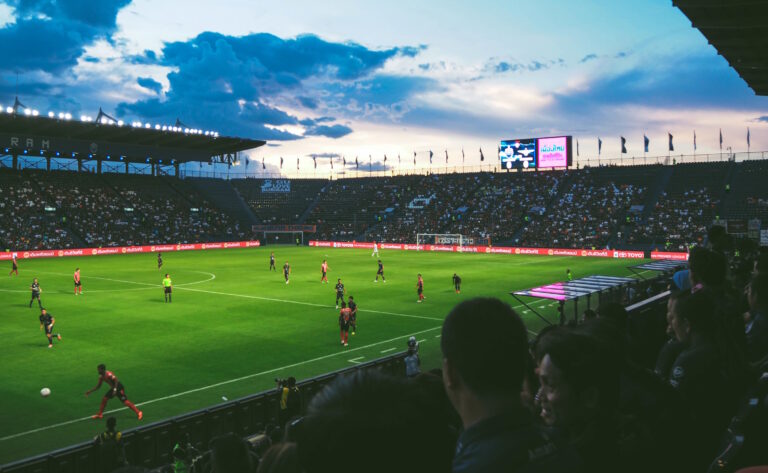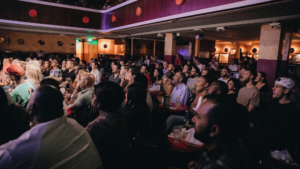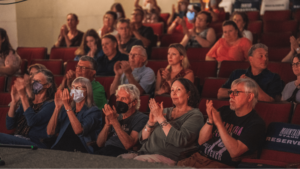This is a guest post by Monika Halicka, Insight Executive at Stadia Solutions, a leading international sports and entertainment marketing agency and technology consultancy. For more sports insights, head to Stadia Solutions Twitter & LinkedIn pages.
The way we consume sports has changed dramatically over recent years. Attending a sports event is no longer only about watching a sporting contest, but increasingly involves the 360° social experience associated with it. With constant access to information, and strong competition for the in-home experience, fans’ demands continue to grow, and event organisers are expected to provide an enhanced live fan experience.
The evolution of the match day experience means that organisers are tasked with creating a more connected, engaging, and interactive environment. Fans are not just simple spectators, and sports facilities need to become highly adaptive entertainment destinations for before, during and after the event to accommodate this.
Modern venues are no longer focusing solely on increasing their tickets sales (for example, the Premier League stadia, tend to sell out long before the event) but increasingly on finding new & innovative ways to drive revenues, getting more sponsors involved, and building stronger relationships with the fans.
The most recent trends that are likely to redefine the game experience will not only open new data and revenue streams for the venues. They will also give them a chance to better understand who their fans are, and how to engage with them efficiently.
- Increased importance of pre and post-match fan engagement
The match experience no longer starts when fans sit down in their seats, but much earlier. Even before they arrive to the stadium. Attendees are likely to begin their match day with social media activity and pre-game pub meetings. This opens up a great opportunity for venues to become much more than just a place for fans to watch sports, and focus on providing whole-day entertainment.
New, high quality concourses and hospitality lounges encourage early arrival, and increase fan engagement opportunities with the event organisers. Digital in-stadia platforms allow fans to check the latest news at the venue, watch the early kick-off games and get in the mood for their game. More and more clubs opt for their own NFL-like fan zones and encourage them to come to the events earlier, extending the fan experience to an out-of-stadium environment.
West Brom’s first ever fan zone proved successful, as live music, big screen TV, games, and family fun provided a vibrant and entertaining build up to kick-off. The new supporter-dedicated area became a great gathering point for fans of all ages to soak up the match day atmosphere.
Back in 2010, Manchester City launched their new match day feature: BT City Square. The pre-match entertainment area lets fans gather together ahead of the day’s game and soak up the atmosphere. The club has also taken full advantage of that additional commercial opportunity, and agreed a ground-breaking deal with BT Sport to sponsor the fan zone, helping to make it one of the biggest permanent fan zones in the country.
- Organisers to become content providers
With growing fan demand for live and exclusive info, venues are expected to provide both reliable connectivity and live game content. Second-screening has become so natural to fans that Wi-Fi and in-stadia mobile apps are no longer considered innovations but, increasingly, a necessity. According to Future’s Foundation research, 69% of fans agree that improving the quality of WiFi connectivity within stadia would significantly improve their overall match day experience. Such necessities are a great complement to other interactive technologies, such as FanTV, being implemented in stadiums.

Live content feeds (including stats and betting odds), news, and club updates allow fans to stay on top of the sporting events, and encourage them to get engaged with their team, club partners and other fans. This leads to a more enjoyable experience for the fans, as well as increased customer loyalty and higher revenues for the venue operators. In fact, 67% of fans expressed their interest in accessing exclusive content before/after the event, and using their mobile to access content displayed on giant screens.
- Fans to become active participants of the event
Nowadays, the live sport experience is up against stiff competition from broadcasters as TV coverage becomes more widespread and innovative. Venues need to ensure they offer a more immersive experience than watching the game at home, which features instant replays and expert insights.
The fans’ chance to take part in man-of-the-match voting, enjoy real-time reactive screen content (as seen on the LED screen pictured below), or get involved in social media conversations directly from the stadium, brings the best bits of TV viewing, with the bonus of live action, to their match day experience.

Image Source: Stadia Solutions
Getting to know the fans better has become one of the main priorities of venue operators, as it leads to greater commercial and marketing opportunities. Therefore, understanding consumer data gathered through mobile apps, Wi-Fi connections and social media involvement is vital for tailoring messages and services for all interested parties.
- Global audience – the stadium is just the start…
Despite the game remaining as the main focus of match day, the way we consume events has shifted towards being constantly connected with those outside of the stadium. Be it the keyboard warrior watching the game at home, or the mates down the road in the pub; fans love to share fan-to-fan content online, e.g. on Twitter, and engage with a wide audience of their family and friends on mobile.
It’s therefore become increasingly important for clubs to develop an effective and engaging social media strategy for those potential customers. Creating a sense of community and improving engagement beyond a local level has proven vital for sustained success.
Manchester United, for example, have created a social media dashboard that incorporates all their social media activity into one page, and is available in 6 different languages. This expands their international fan base – and helps the dedicated fan watching in a bar in Bangkok connect with those in the stadium.
Borussia Dortmund, on the other hand, along with the launch of the WiFi in the stadium, added a match day-mode to its official mobile app, which allows the BVB fans to decide how they want to follow the match. The 3 available options that keep the fans up to date with the most relevant info are:
- I am in the stadium
- I am following the game live on TV/radio
- I am on the road and only need the most important info
This approach uses targeted content to encourage both local and international fans to stay engaged during the whole match day – whether at home or away.
Conclusion: The match day experience of tomorrow
The match day experience is constantly evolving – from standing-only terraces to luxury lounges – and will continue to do so as venues race to improve connectivity and become closer to their attendees.
The way fans support their teams has also changed, as smartphones have become a permanent addition to our lives, making social media activity (arguably) as important as real-life interaction.
Even though expected innovations, like mobile F&B ordering and delivery, instant replays, and beacons, have not become the norm in UK venues yet, new technologies are finding their way into the stadium every day.
And looking outside of the stadium, Virtual Reality technologies could soon become new competitors for venues, as they will be able to provide a stadium-like experience for fans at home.
These could bring both benefits and challenges to sports venue operators, but should ultimately be treated as opportunities to build stronger relationships, bigger fanbases, and increase sponsor value.







